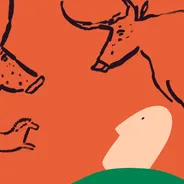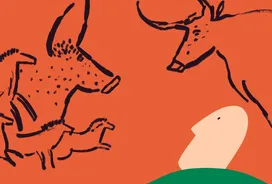
Why brands are stories? Part I. How stories became to matter
In a series of three articles, Marc Català, partner at Mucho, explores the intimate links between brands and stories. Here he writes about how stories became to matter.
In this first part of the series, the author goes back 30.000 years to understand how stories, beliefs and values changed humankind, and what that means for brand design.
A Brand is a fiction. A myth. A collective hallucination. A brand is a shared story that binds a group of people in the pursuit of a common goal. Companies and products are real. Brands are not. Brands are stories.
But stories shape human motivations, and human motivations shape the reality that surrounds us. If we are to manage brands, and so manage the shared perceptions of thousands, even millions of people, we’d better understand how stories work.
We have used stories to cooperate in big numbers and become the dominating species on earth.”
The cognitive revolution: how stories helped us rule the world
Symptoms of change. T(r)ending towards BTC
Some 30.000 years ago, groups of homo sapiens managed to gather together in groups bigger than 150 members. How could they stick together, when over that threshold they could not remember who belonged to the group? Scientists believe that this was because of the Cognitive Revolution. Arguably the biggest of all revolutions, it allowed humans to invent fiction. And once we could talk about fiction and myth, we could collaborate in large numbers. We could trust humans we didn’t know, because we could trust we all believed in a common myth (albeit a myth we believed to be true). That’s what stories did for us, and we have used them to cooperate ever since, becoming the dominating species on earth. Stories are simply a 32.000 year old truth.
Stories help us make beliefs tangible by creating symbols and characters that we can relate to. That’s also what great brands do.
The (dangerous) Power of Stories
It is in our nature to tell stories. Storytelling is an intrinsic human development. Stories are the ways in which we convey and structure meaning, so that we can pass it on and share it. They are the way in which we make meaning more emotional, engaging, entertaining and dramatic. Because stories help us connect to meanings and beliefs, they are the vehicles of the truths we believe in. It is easier to remember a story than a set of beliefs or a complicated philosophy.
Stories help us make those beliefs tangible by creating symbols and characters that we can relate to. That’s also what great brands do. We can remember a story. And so ultimately, stories become the truths we live by. The truths we live in.
It makes sense to design companies, brands and products following the values we believe in.

Meaning and Values in Brands
Before we understand stories let’s take a shallow detour to (superficially) understand meaning. Meaning is what makes sense to us. It is what we believe to be true. In that sense, it really is more important what we believe in, than what is true. Meaning is shaped by beliefs. And beliefs are nurtured by value. We believe in what we value. There is a principle in branding and marketing that people ultimately buy products as much by what they represent as by what they actually are. In other words, by what they mean. The products we like are designed in a way that appeals to what we believe in. If so, it makes sense that the products we like are designed by people who also share, or at least understand, the values we believe in. And so it makes sense to design companies, brands and products following the values we believe in. They will intimately connect us to customers who share our beliefs. That connection establishes a powerful and lasting brand relationship.
Stay tuned for the second part of this series, and find out how values can be structured into a story to obtain a meaningful brand.
Words: Marc Català, partner at Mucho
Illustrations: @lenka.re


